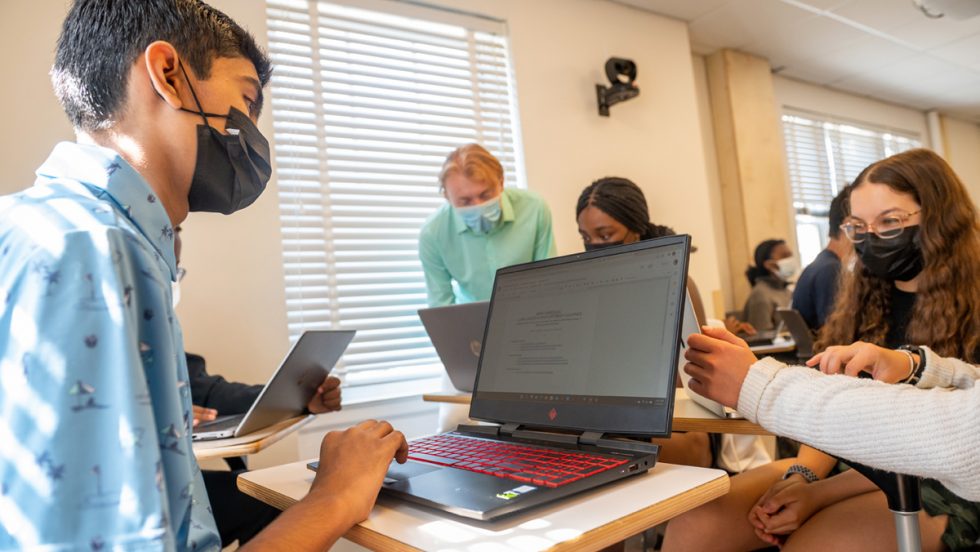
Organized by two Adelphi Department of Mathematics and Computer Science assistant professors, the inaugural session of the Adelphi Summer Institute in Mathematical Epidemiology gave Long Island high school students an opportunity to conduct original research projects in mathematical epidemiology that focused on COVID-19 and cancer.
For six weeks this past summer, every Monday through Thursday from 9:00 a.m. to 2:00 p.m., 25 rising 10th-, 11th- and 12th-grade students convened on the Adelphi campus to take part in the first-ever Adelphi Summer Institute in Mathematical Epidemiology (ASIME).
“Most students came to ASIME with a passion for the life sciences, but with somewhat less appreciation for the role of mathematics in the study of epidemiology,” reported Assistant Professor Anil Venkatesh, PhD, who, along with his Department of Mathematics and Computer Science colleague Assistant Professor Joshua Hiller, PhD, organized the summer camp.
“Through ASIME, our students carried out authentic research problems from start to finish, developing technical skills in the process that will transfer to any career they may choose to pursue. Even more important,” Dr. Venkatesh added, “ they witnessed in their own work how mathematics can help us tackle some of the most pressing public health problems of the present day.”
Projects Tailored to Student Passions
“I provided the projects, while Dr. Venkatesh interviewed students at the beginning of the session so we could pair students with projects suitable to their goals and to give them a tailored experience throughout the six weeks,” Dr. Hiller recalled.
According to Dr. Hiller, students worked in teams of three or four. One team determined that vaccines prevented as many as 1.5 million infections in the early days of the pandemic in New York state. Another team presented a statistical analysis of cancer incidence. A third team, comprising students interested in data science, gathered and analyzed data on policies related to tobacco consumption.
“We wanted the students to understand that math and epidemiology offered wide areas for exploration,” Dr. Hiller explained. He noted that four “fantastic undergraduate research assistants” helped to support camp students with their projects.
Presentations From Leading Experts
Virtual presentations from experts in the field covered topics including how basic probability theory is encountered in everyday life, epidemiological models for infectious diseases, an evolutionary theory of cancer, and how math can be used to help solve large-scale problems—such as deforestation—resulting from climate change.
Dr. Hiller said the whole experience culminated in a symposium attended by College of Arts and Sciences Dean Vincent Wang, PhD, and Adelphi Provost and Executive Vice President Christopher Storm Jr., PhD, who encouraged our students,” Dr. Hiller said.
Support From Across the Adelphi Community
ASIME was supported by the School Science Advancement Program for the NYS Science Technology Entry Program at Adelphi (SSA/NYSSTEP), which provided 10 free spots for students of color and students with limited incomes, according to Dr. Hiller. An external grant from the American Mathematical Society provided additional support.
“There was a beautiful group effort from the Adelphi community—including the Office of Admissions and the Department of Mathematics and Computer Science,” he said. “We didn’t want to differentiate between lower- and higher-income students, so Admissions generously covered meals for STEP students. Community solidarity helped make ASIME affordable for everyone.”
Dr. Venkatesh was especially gratified by the “dedication shown by every ASIME participant. Our students chose to spend half their summer vacations learning advanced mathematics, wrestling with obstinate computer code, and honing their skills in teamwork and professionalism,” he said. “It is truly an honor to support the careers of such dedicated young scientists.”
Update: August 18, 2023: The Adelphi Summer Institute in Mathematical Epidemiology was held for a second time from during the summer of 2023. Dr. Venkatesh reported that the program concluded on August 10, 2023, with a closing symposium in which nearly 100 attendees gathered for the keynote lecture from Lauren M. Childs, associate professor of mathematics at Virginia Tech, along with “individual research presentations from ASIME alumni who have gone on to compete in regional research competitions, and the much awaited ASIME research group presentations,” he said.
“This year we had 30 enrollees who worked in groups of four or five on original research projects in mathematical epidemiology,” he continued. “Two groups built infectious disease models and applied them to real COVID-19 infection data. Two groups created machine learning models for cancer screening and applied them to real data on lung and pancreatic cancer. Two groups built statistical models of cancer incidence and applied them to real data on breast and penile cancer. One group combed through public-health data sets to identify variables linked to gun violence and used advanced statistical methods to estimate the impact of incarceration rate, household income and other variables on gun-related deaths. ”
This year’s ASIME session was supported through generous contributions from the American Mathematical Society and from Adelphi’s College of Arts and Sciences Dean’s Office and the Office of the Provost.